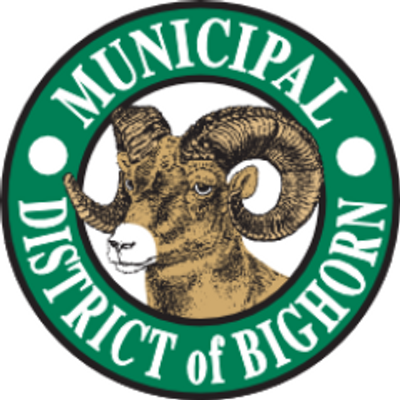BIGHORN – The MD of Bighorn banked a $1.9 million surplus out of its 2018 budget and voted to put the money into its reserves earlier this month.
As a result, councillors voted to create a new reserve fund for replacing bridges in the municipal district at its April 9 council meeting.
“Bridge money has always been difficult to achieve even when money was available,” Reeve Dene Cooper said during the meeting.
Typically, surpluses in the MD are reallocated as per policy, with 40 per cent to vehicles and equipment,
40 per cent to engineering structures, and 20 per cent to roads. But due to reserve limits, $1 million for vehicles and equipment and $2 million for engineering structures – only $287,384 was assigned to engineering structures and $396,948 was allocated to roads, with the vehicle reserve already capped.
The remaining $1.3 million unallocated surplus was then divvied up between the new bridge reserve, $300,409, and the remaining $1 million allocated to the flood reserve.
“A considerable amount of work will be required in upcoming years for bridge refurbishment and replacement,” wrote administration in the staff report. “It is advisable to build up the reserve account to have funds available for these pending projects.”
The decision to move the funds into the new account was made unanimously with only councillor Erik Butters questioning why a specific account was needed, when he thought bridges were funded under the engineering structures reserve.
Chief Administrative Officer Rob Ellis said there will be major future renovations to the current bridges and this type of pre-planning is a way to avoid “sticker-shock.”
“I know this is not a hill to die on ... I guess I want to sharpen the definition of engineering structures,” Butters said.
The decision was also applauded by Cooper, who said having a bridge reserve sends a “great message” to grantors – where depending on the types of grants, some can match the amount of funds in a reserve for projects.
NO TAX INCREASE
While talking about the budget, it was also noted MD of Bighorn council voted to keep the same residential and non-residential municipal residential property rates as last year.
However, that doesn’t mean property owners won’t see differences on this year’s tax bill when compared with last year’s.
“While there is no change to the municipal tax rate, there have been changes in assessed values,” Shaina Tutt, MD director of finance said in an email after the meeting. “As a result, the amount collected through municipal taxation will vary based on the assessment of the property.”
Originally at the March Finance and Economic Development Committee meeting, the committee recommended a 1.5 per cent increase to the municipal tax rate from 2018 for the 2019 tax year, but after hearing concerns brought up at the meeting, administration proposed there be no change from the 2018 rates.
EMERGENCY SOCIAL SERVICES PILOT CREATED
Since the 2013 flood, concerns have not gone unheard, as the MD of Bighorn is launching a new emergency social services registration and reception centre in preparation for the next natural disaster.
“We wanted to make it nicer for residents if they get evacuated again, so they don’t have to tell their stories over and over again and re-traumatize them,” Deb Grady, community services coordinator with the MD of Bighorn said at the council meeting.
After the 2013 flood, Grady said they found residents were subject to telling their evacuation tales repeatedly causing unnecessary re-traumatization, but now the victims of a natural disaster should have a more streamlined post-evacuation process with the implementation of the pilot program.
The Provincial Registration and Reception Centre Program (RRCP), a cloud-based system, will be able to register families and pets during an emergency evacuation and is set to be ready for the spring.
“There is a lot of appreciation for this,” Coun. Paul Ryan said at the presentation.
In the decision report, there were several justifications for adopting the pilot program, highlighting the low cost, as training is provided free of charge and the courses are available online, eliminating travel costs.
“Discussions between the MD’s director of emergency management, ESS manager and reception centre manager agreed that this would be a useful tool for the MD,” wrote administration in a staff report. “Staff would be able to quickly process evacuees and to better serve those residents by having all their information in one place.”
Councillor Paul Clark questioned if a change of government, for example the UCP winning the majority in the recent provincial election, could change the program. Grady commented that it “could over time,” but noted this program was initiated through the previous PC government and carried on through the NDP rule.
Council unanimously passed all three readings to start staff training and kick off the pilot.




